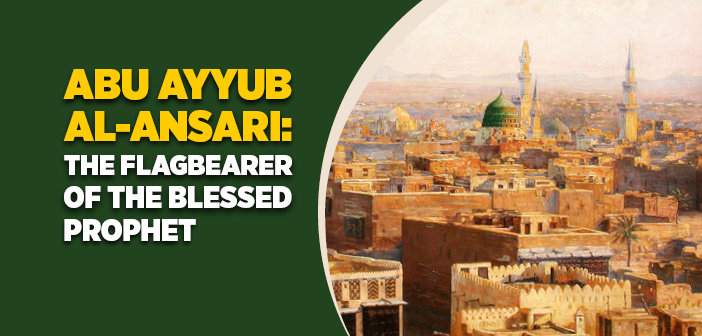What is the adhan? Where was the first call to adhan read? When was the first call to adhan read? Who was the first call to adhan?
Only the words ‘to salat, to salat’ were called out in the beginning to inform Believers of the time of worship. The blessing of adhan was to come awhile after.
In the meantime, the Noble Messenger -upon him blessings and peace- was consulting his Companions about the ideal way of calling Believers to salat. “Let’s put up a flag at the time of salat”, some said, “…and Believers could notify each other as soon they see it.” But the Blessed Prophet -upon him blessings and peace- did not fancy the idea; neither was he keen on the proposal of blowing a horn, which he dismissed for being “an instrument of the Jews.” Again, the Blessed Prophet -upon him blessings and peace-, was not fond of the idea of ringing bells, which was also brought up in the discussion, as it was “a typical Christian practice.” Abdullah ibn Zayd -Allah be well-pleased with him-[1], a Companion present throughout the discussion and able to empathize with the feelings of the Noble Messenger -upon him blessings and peace- , made his way back home. There, as he lay in a state between slumbering and wakefulness, he had a vision of the adhan. He immediately returned next to the Messenger of Allah -upon him blessings and peace- , telling him how he had been “taught the adhan as he was lying down.”
After finding out that Omar -Allah be well-pleased with him- had also seen the same dream, the Prophet of Mercy -upon him blessings and peace- commanded Bilal -Allah be well-pleased with him- to repeat aloud the words Abdullah ibn Zayd -Allah be well-pleased with him- had heard. The echoes of adhan were thus heard for the very first time. (Abu Dawud, Salat, 27/498)
Adhan thus became a Sunnah, strong enough to be on level par with compulsoriness (wajib), for it is attested to by an affirmative dream, the practice of the Blessed Prophet -upon him blessings and peace- and Divine Revelation, which cites:
“And when you call to prayer…” (al-Maida, 58)
Although it was Abdullah ibn Zayd -Allah be well-pleased with him- who proved to be the medium in sanctioning the adhan, it must be borne in mind that it was always the Blessed Prophet -upon him blessings and peace- who was subject to Divine Revelation and heavenly inspiration. Only after his approval was the adhan established as the means of calling Believers to mosques. Once Bilal Habashi -Allah be well-pleased with him- called the first adhan, the Divine invitation reached every corner of Medina and the Believers paced exuberantly towards the Masjid underneath skies shaking with the echoes of the adhan.
Despite the proposal of numerous means of inviting Believers to the mosque, the Light of Being -upon him blessings and peace- disapproved of all of them apart from the adhan, which he instated with great enthusiasm. The adhan is undoubtedly a precise summary of Islam’s conception of Allah, glory unto Him and the Prophet -upon him blessings and peace-, as well as its notion of worshipping and life in general, to all of which it then helps bond the Believer. It could be said that the Messenger of Allah -upon him blessings and peace- hence decided on the best option possible in inviting people to salat.
Confirmed by both the Quran and Sunnah, the adhan has continued for over the past 1400 odd years to give Muslims an invitation from the heavens. It is a universal and international call for salat, for which reason it cannot be recited in any other form than its original. Virtually the heavenly chant of the skies, it summons those who hear it to compliance.
The Blessed Prophet -upon him blessings and peace- has said:
“When you hear the adhan, repeat it with the muaddhin, word for word. Then send me a greeting, for the mercy Allah shows for it is ten times the amount of one’s greeting. Then pray that I get to receive the wasila, a rank in Paradise that will be granted to just one servant of Allah. I anticipate that I shall be that one. I will consider myself obliged to intercede on behalf of each person who asks from Allah the wasila on my behalf.” (Muslim, Salat; Abu Dawud, Salat, 26/523)
In another hadith, the Blessed Messenger -upon him blessings and peace- explicitly assures Paradise for those who repeat the words of the muaddhin upon hearing the adhan.[2] And regarding the prayer to be made after, he has said:
“I will most definitely intercede on behalf of a person who repeats the following after hearing the adhan: O the Lord of this perfect invitation and the offered salat! Grant Muhammad -upon him blessings and peace- wasila and fadila and resurrect him upon the rank of Mahmud which you have promised!” (Bukhari, Adhan, 8; Abu Dawud, Salat, 37/529)
The virtues of adhan have been the subject of many ahadith, some of which are below:
“Two prayers are never or very seldom refused: The first is the prayer made following the adhan, and the second is the prayer made during battle, just when both sides launch into each other.” (Abu Dawud, Jihad, 39/2540)
“Had people known of the rewards awaiting those who call out the adhan and those standing in the first row during salat, and they had no other way to decide than to draw lots, they certainly would have.” (Bukhari, Adhan, 9, 32; Muslim, Salat, 129)
“Whenever the adhan is called for salat, Shaytan flees, noisily breaking wind, and escapes to a place where he cannot hear the adhan. Once the adhan comes to an end, he returns; and runs off once again when the qamah starts. He then returns once more, creeping into passage that runs to the heart of a person, whispering ‘think this, remember that’; things which were previously no way near one’s thoughts, to the extent that one taken in by these whispers can no longer remember which stage of the salat he is in.” (Bukhari, Adhan, 4; Muslim, Salat, 19)
[1] Abdullah ibn Zayd ibn Asim al-Ansari –Allah be well-pleased with him- earned the Blessed Prophet’s -upon him blessings and peace- praises for closely defending him during the Battle of Uhud. Abdullah was not alone in his heroism during the battle; his entire family showed immense courage throughout, for which the Noble Messenger -upon him blessings and peace- prayed they be neighbors with him in Paradise. Time and again, the Blessed Prophet -upon him blessings and peace- would visit the house of Abdullah ibn Zayd, where he performed many a salat. Ibn Zayd al-Ansari -Allah be well-pleased with him- was among the Companions imbued with the greatest affection for the Prophet of Allah -upon him blessings and peace-. Shaken upon receiving the news of the Prophet’s -upon him blessings and peace-passing away, Abdullah made a heartfelt plea, praying the Almighty to ‘…take away my sight so I do not get to see anyone after Muhammad -upon him blessings and peace-!’ His plea was accepted there and then, and Abdullah -Allah be well-pleased with him- lived the rest of his years a blind man. (Qurtubi, V, 271) He was later martyred at Harra with his two sons.
[2] Muslim, Salat, 12.
Source: Osman Nuri Topbaş, The Prophet Muhammed Mustafa the Elect II, Erkam Publications





